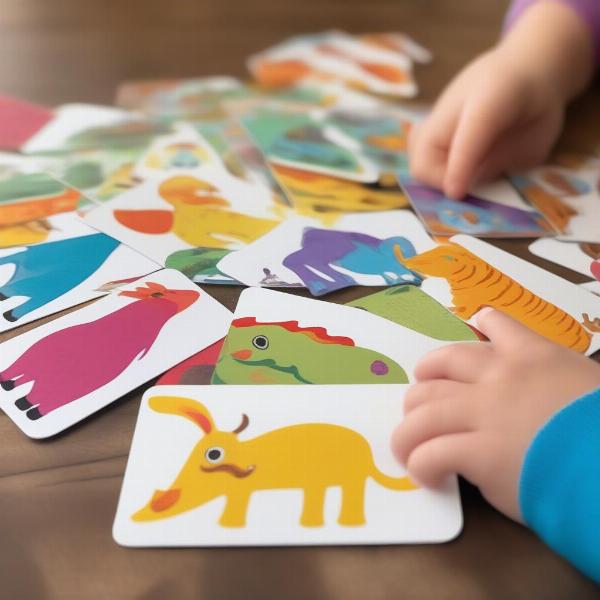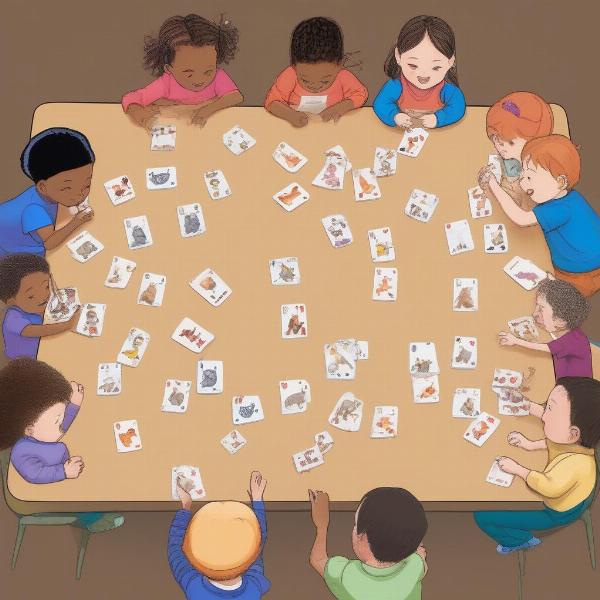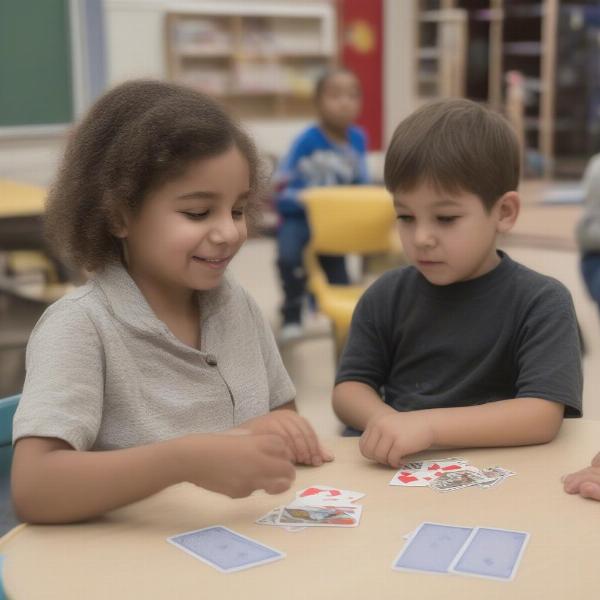At supremeduelist.blog, we understand the importance of engaging learning experiences for young children. That’s why we’re diving into the world of card games perfectly suited for kindergarteners. These aren’t your average decks; they’re carefully designed to boost cognitive skills, enhance social interaction, and of course, provide a whole lot of fun. This article will guide you through a selection of the best card games, offering tips and insights into why these games are excellent for early childhood development.
We’ll explore card games that focus on matching, memory, and simple counting. From colorful picture cards to those introducing basic concepts like numbers and shapes, these games are more than just entertainment. They are valuable tools for teaching crucial skills, encouraging turn-taking, and fostering a love for learning through playful activities. Get ready to discover some fantastic options that will have your kindergartners asking for “just one more game!”
Why Card Games are Great for Kindergarteners
Card games offer numerous benefits for young children, making them an excellent choice for both home and educational settings. They are a fantastic way to introduce basic skills in a fun and interactive manner. Unlike some other forms of play, card games naturally encourage structured turn-taking and require children to pay attention to the game’s rules. This builds important social and cognitive skills, developing the foundation for more complex interactions later in life.
Card games are highly adaptable and can be modified to suit different skill levels. Whether it’s simply matching colors, recognizing numbers, or following basic sequences, the games can be adjusted to meet children where they are at. This adaptability makes them suitable for diverse learning environments and for children with varying needs and abilities. The compact nature of card games also allows for easy storage and transport, making them ideal for on-the-go entertainment.
Top Card Game Picks for Kindergarteners
When selecting card games for kindergarteners, it’s crucial to choose those that are age-appropriate and engaging. Look for games with simple rules, colorful designs, and clear objectives. These characteristics ensure that young children can easily grasp how to play while remaining interested in the game. Let’s take a look at some of the top card games that fit the bill.
Matching Games: Sharpening Visual Skills
Matching games are a staple for early childhood development. They are excellent for helping children sharpen their visual discrimination skills, which involves being able to identify similarities and differences between objects. Simple matching games with pairs of cards featuring animals, fruits, or shapes can keep kindergarteners engaged for hours. The focus on recognizing identical images also enhances their memory and concentration.
 kids-matching-game
kids-matching-game
One very popular type is the classic memory matching game, where cards are laid face down, and kids take turns flipping over pairs, trying to find matches. “Memory matching games build not only visual recognition but also crucial working memory skills which are key to early learning,” says Dr. Emily Carter, an educational psychologist. This type of game is fantastic because it combines fun with critical developmental learning.
Number and Counting Games
Introducing numbers and counting early is vital for math foundations. Card games that incorporate numbers are excellent tools for this. Games that use simple number recognition or sequencing are both fun and educational for kindergarteners. These games allow children to associate numbers with quantities and to understand the concept of sequential order.
Games might include sequences, where kids have to lay the cards in the correct order, from 1 to 10. This exercise not only teaches them about numbers, but also develops their pattern recognition abilities, which is important for understanding math concepts later on. These card games become interactive learning experiences, making the introduction to math more fun and less daunting.
Color and Shape Recognition Card Games
Color and shape recognition is a crucial early childhood skill, and card games make learning these skills exciting. These kinds of games often include simple matching or sorting tasks, which can help kindergarteners develop a deeper understanding of geometric shapes and the concept of different colors. By associating different cards with shapes, colors, and patterns, children improve their pattern recognition. This also helps to increase their ability to categorize and differentiate, which are key to literacy and math later on.
These games are beneficial because they often use bright, engaging colors, and familiar shapes, keeping the children interested and excited about learning. The games typically involve simple rules, which make it easy for even young kindergarteners to participate and enjoy, boosting their confidence and early cognitive development. These color and shape recognition games can also be paired with real life objects, to reinforce learning and connect it to the world around them.
Action-Based Card Games
For kindergarteners who need to move around, action-based card games are a fantastic choice. These games often incorporate simple movements or activities into the gameplay, making them an engaging option for active kids. The combination of physical movement with cognitive tasks, like matching or recognizing, helps stimulate multiple areas of development. These games can be simple, using cards with pictures that correspond to a simple movement or a sound.
 kindergarten-learning-cards
kindergarten-learning-cards
These types of games also help improve their listening skills, as they must pay attention to the card drawn to understand what they need to do. They also promote following instructions, which is critical for a classroom environment and everyday life, and they build cooperation and friendly competition. “Action-based card games offer a wonderful way to integrate movement and learning,” notes Sarah Johnson, a child development specialist. They’re also a great way to burn off some energy!
Tips for Choosing the Right Card Game
Selecting the best card game for your kindergartener depends on their specific needs and interests. Consider their current skill level and look for games that are appropriately challenging without being overly frustrating. Start with simple matching games before moving on to games with more complex rules. Consider these aspects when choosing the right card game:
- Age Appropriateness: Ensure the game is designed for kindergarten age, with age marking on the box being a great indicator.
- Simplicity of Rules: Simple, easy-to-understand rules help keep kids interested and actively involved.
- Engaging Design: Look for colorful, visually stimulating cards and familiar characters that make kids excited to play.
- Educational Value: Choose card games that offer a balance of fun and learning, incorporating key skills like color recognition, counting, and memory.
- Durability: Select cards made from sturdy materials to withstand repeated use by young children.
How to Play Card Games with Kindergarteners
Teaching a card game to a kindergartener requires patience and clarity. Begin by showing them the cards and explaining the goal of the game, be it matching, sorting, or anything else the game involves. Demonstrate each step of the gameplay clearly, and be prepared to repeat instructions as needed. Encourage them to ask questions if they are confused, and celebrate their successes, no matter how small.
During the game, emphasize following the rules and respecting turn-taking. This helps kids build social skills while having fun. Be adaptable and willing to modify the game to match the children’s abilities and interests. The goal is to make it a positive experience, so they associate play with learning and discovery. The more engaging and enjoyable the game, the more likely children will want to continue learning.
 kids-playing-together
kids-playing-together
Conclusion: Fun and Learning Combined
Card games offer a fantastic blend of fun and learning, making them an ideal choice for kindergarteners. From enhancing memory and counting skills to fostering social interaction, the benefits of card play are numerous and beneficial for early childhood development. Through carefully selected games, children are able to enhance their learning in a playful and engaging setting, encouraging their natural love for games and curiosity, and preparing them for future learning.
Remember to choose age-appropriate games with simple rules and engaging designs. Introduce the games with patience and encouragement, and always be ready to adapt to your child’s needs and abilities. At supremeduelist.blog, we’re committed to providing you with the best resources to support your child’s development through games. So, get ready to shuffle those cards and have some fun! What are your favorite card games for young learners? Let us know in the comments below, and keep checking back for more game analysis and insights!
Leave a Reply